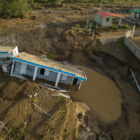Actualidad
The Trump Administration’s Climate Policies Jeopardize Research in Disaster-Prone Puerto Rico
|
As one of the regions most affected by the global climate crisis, local scientists are struggling with canceled research grants and funding cuts from federal agencies.










